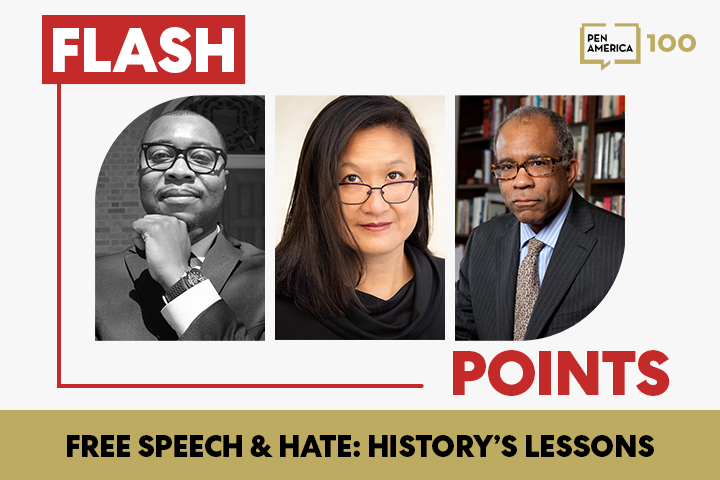Free Speech & Hate: History’s Lessons

Should the right to free speech extend to the right to engage in hateful expression? At many points in U.S. history, the First Amendment has been invoked to protect the freedom to denigrate people and groups. From decades-old media like The Birth of a Nation, a film that celebrated the racist ideologies of the Ku Klux Klan, to recent legal battles over the reclamation of racial slurs as seen in Matal v. Tam, the question of just how far free speech should go is the focus of this panel discussion. This discussion tackles the question of how a diverse, democratic society can defend free speech while also standing up to bigotry.
DOWNLOAD OUR DISCUSSION GUIDE AS A PDF
Video Highlights
- 3:47 Listen to Victor Luckerson read his essay “Living in the Age of the White Mob.”
- 20:30 Listen to Randall Kennedy discuss attempts to ban Birth of a Nation in the 1910s and why it is good that these attempts mostly failed.
- 37:05 Listen to Jennifer Ho discuss the 2017 Supreme Court case Matal v. Tam and why the Supreme Court ruled that the disparagement clause in trademark law violates free speech.
- 55:10 Listen to Ho share about various threats she gets and how the cost of hate speech is disproportionately borne by people of color.
- 58:23 Listen to Kennedy discuss why bans on hate speech are problematic because they raise the question of who has the authority to set the standards for banning.
- 1:03:28 Listen to Ho talk about how some recent anti-abortion laws impinge on the right to free speech.
- 1:05:00 Listen to Kennedy discuss frequent misinterpretations of the First Amendment as allowing all speech.
- 1:15:25 Listen to Ho discuss a recent Supreme Court case regarding where free speech ends and where harassment begins.
The power of free speech is called into question when hateful expression is used to incite hatred or harm groups of people. On the other hand, free speech can be a valuable tool for preserving and sharing our nation’s history. In the short video below, Karlos Hill explains how the Tulsa Race Massacre and subsequent efforts to rebuild a community illustrate the complexity of free speech versus hate speech.
Contributing Scholars
Dr. Karlos K. Hill is Advisor to the President for Community Engagement and Regentsʼ Associate Professor of African and African American Studies at the University of Oklahoma.
Jennifer Ho is the director of the Center for Humanities & the Arts and Professor of Ethnic Studies at the University of Colorado, Boulder, where she teaches courses on Asian American culture and Critical Race Theory.
Randall Kennedy is Michael R. Klein Professor at Harvard Law School where he teaches courses on contracts, criminal law, and the regulation of race relations.
From the PEN archives
- “The New Intolerance: Race” with Eric Liu, Thulani Davis, and Kwame Anthony Appiah (1998)
- “Native American Voices: A Dialogue Across the Generations Public Reading” with Muriel Miguel, Joy Harjo, N. Scott Momaday, Sherman Alexie, & James Welch (1994)
- “Freedom to Write: First Amendment” with Stephen L. Carter, Benjamin C Bradlee, Morely Safer, Kathleen Sullivan, Judith Krug, John A. Powell (1992)
For a Deeper Dive
- The 1921 Tulsa Race Massacre: A Photographic History by Karlos K. Hill
- Racial Ambiguity in Asian American Culture by Jennifer Ho
- Nigger: The Strange Career of a Troublesome Word by Randall Kennedy
- “Living in the Age of the White Mob” by Victor Luckerson
